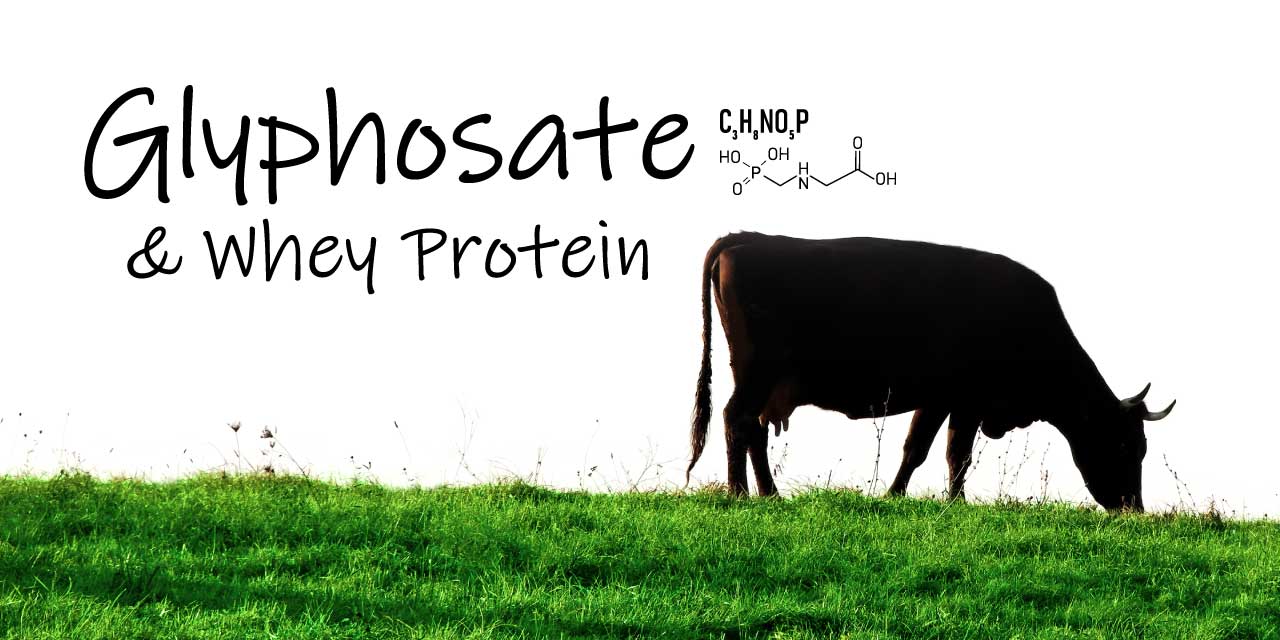Glyphosate & Whey Protein Powder

What is Glyphosate?
Glyphosate (glai·fo·sayt) is the most widely used herbicide in agriculture. The first use of the chemical technology in the United States dates back to the 1970s (FDA Registration Date), but not until recent class-action lawsuits have Glyphosate compounds entered mainstream conversation.
The flagship product of the former US powerhouse, Monsanto, known as "Roundup," is the most prominent weed killer globally, with both mass commercial and residential single-serve applications.
If you eat greens regularly, you have consumed glyphosate residue. The popular signage on prepacked vegetables that reads "wash before use" addresses the inevitable truth about how abundant this chemical is on the earth's surface.
What Purpose Does Glyphosate Serve?
Glyphosate is a chemical designed to kill any plant that isn't engineered to resist it. Targeting broad-leaf weeds capable of rendering farmland useless, Its notoriety stems from being marketed as "practically harmless" to animals, soil, and humans.
Again, the safety keystone resides in a metabolic pathway humans don't possess and thus has no quantifiable impact. Like all science, as information evolves, so does our understanding of the "facts."
Glysophate in Protein Powder?
Intuitively, and similar to contamination of powdered supplements with heavy metals, plant-based proteins, particularly pea protein, contains the most significant glyphosate concentrations within the dietary supplement industry.
If you enjoy plant-based protein powders, we urge you to understand if the brand is testing or turning a blind eye toward herbicide contamination.
Learn More: Pea Protein Vs Whey Protein
What is the Shikimate Pathway?
When plants contact glyphosate, the compound works to disrupt the plant's shikimic acid pathway (a metabolic process unique to plants), ultimately crippling the plant's ability to absorb nutrients and killing the plant.
The Shikimate Pathway, a.k.a (shikimic acid pathway), is a metabolic pathway that enables the biosynthesis of amino acids to which protein is made.
The initial basis of glyphosate advocacy especially among the scientific community is that the metabolic pathway in question is exclusively used by bacteria, archaea, fungi, algae, some protozoans, and plants, thus absent in humans and animal cells. Naturally, the inference that glyphosate is safe depends on the basis that the human body is not impacted.
As science continues to progress, more publications suggest glyphosate consumption influences our health through ancillary means via the gut microbiome, a critical ecosystem depending on the health and function of microorganisms in the trillions [7].
We have included "gut inflammation" due to routine glyphosate consumption to our typical side-effect causes associated with low-quality plastic tub whey.
Learn More: Side Effects of Whey Protein
Whey Protein Brands - Glyphosate Testing
Every pouch of AGN Roots is tested for Glyphosate. The drive to test our product for glyphosate contamination should not be conflated with our stance on its efficacy as a safe herbicide.
That opinion is irrelevant; we test for Glyphosate because all grass-fed dairy is a susceptible carrier, even if it's safe to consume; why would you want to if given the option to decide?

Is Glyphosate Banned?
Currently glyphosate is only banned as a precautionary measure in very select countries, however legislation that greatly restrict its use is shared by over 20 countries including the UK. Germany has vowed to eliminate it's prior to 2024 [5].
Glyphosate Free Protein Powder
Although we love to research areas of concern for our community, we are not interested in aligning with one opinion or another on whether Glyphosate is a safe herbicide or not.
However, we take the stance to ensure there is no glyphosate residue in AGN Roots Grass-Fed Whey, Glyphosate-free protein powder.
This is a big problem in the dairy protein industry that for the most part is flying fast under the radar. No matter the outcome, if routine exposure can be eliminated or reduced we certainly recommend it.
Glyphosate in Whey Protein - Is it Safe?
Unfortunately, this highly debatable question can be researched and answered to justify either side, depending on where you find yourself. If you are influenced by the World Health Organization (WHO), infamous for being susceptible to geopolitical influence, you are in the camp that glyphosate is pure poison.
On the other hand, if you are on the side of the United State's Food & Drug Administration, also wildly susceptible to corruption) you may believe in the narrative that the chemical compound, albeit sprayed generously on all commercial agriculture, is not connected to any health concerns to the public.
The International Agency for Research on Cancer IARC 2015 declared a probable likelihood that glyphosate is carcinogenic but doesn't factor in "likelihood" of occurrence into its risk assessment, only the hazard.
IARC Classifications include -
| Category 1 | Carcinogenic to humans |
| Category 2A | Probably carcinogenic to humans |
| Category 2B | Possibly carcinogenic to humans |
| Category 3 | Not classifiable as to its carcinogenicity to humans |
| Category 4 | Probably not carcinogenic to humans |
Given a "2A" classification, glyphosate is now considered to have the potential to cause cancer. The category is not strictly definitive but shows how backward the system can operate.
Current legal precedent is in place that calls for long-term research to prove beyond a doubt that causation does or does not exist. Lawsuit victories like the recent 2018 non-Hodgkin's lymphoma court case resulted in a forced verdict by the jury as Bayer (Monsanto) was challenged to prove their innocents (glyphosate did not cause cancer) rather than the prosecution their negligence or guilt.
Guilty verdicts or settlements like this are often selectively cited to sway public opinion around causation when no such research has been done one way or the other to bolster a sturdy relationship.
For the last 40 years, the general U.S. public has been told by the Environmental Protection Agency (EPA) that independent glyphosate evaluations that take place on a 15-year cycle found the following -
- No risk or concern to human health
- No indication that children are more or less sensitive
- No causation that glyphosate is connected to cancer when looking at "cancer" as a whole.
The EPA, in this case, does not agree with the world health organization's cancer research faction [1]. Despite the EPA ruling on this topic on its website, over 100,000 U.S. lawsuits currently correspond with $11B in damages being awarded by the Bayer Corporation (formally known as Monsanto).
Glyphosate in Grass-Fed Whey
The biggest problem with mega-dairy operations, especially within the United States, is glyphosate and its non-discriminative widespread application to fields dedicated to producing feeds and hay-silage.
Glyphosate is very soluble in hydrophilic solvents, which lends itself to behaving incredibly mobile in water. The high mobility of glyphosate in water creates a perfect soil and groundwater leaching environment [6].
The impacts of glyphosate are undoubtedly addictive and a threat to the environment. As glyphosate is routinely dispensed into the atmosphere, lower-quality crops are produced every year due to deteriorating soil fertility. Unfortunately, the science backs up the toxicological effects of glyphosate and its unintended impacts on soil biodiversity.
Learn More: What is a CAFO?

